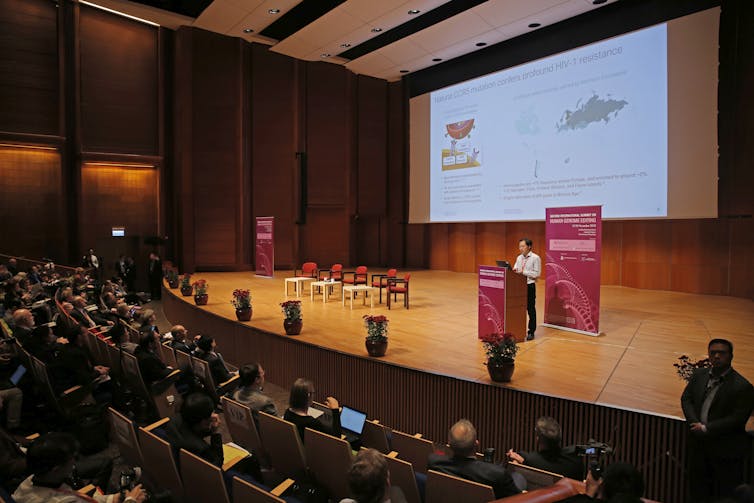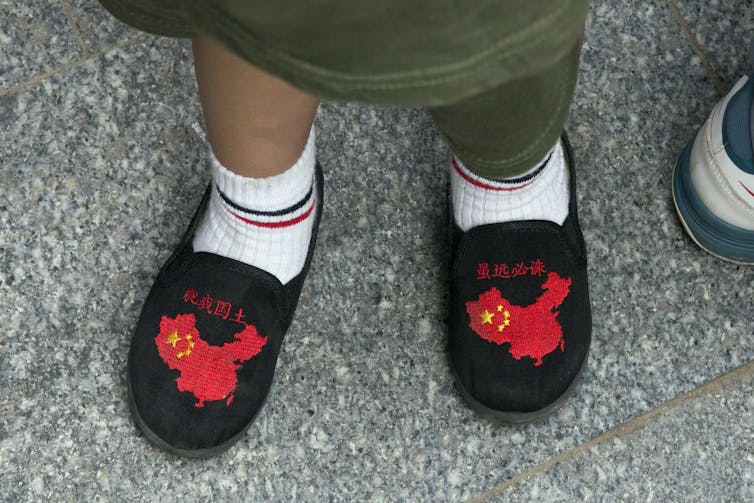CRISPR babies and other ethical missteps in science threaten China's global standing
- Written by Caroline Wagner, Milton & Roslyn Wolf Chair in International Affairs, The Ohio State University
“What happened this time was an ethics disaster for the world,” according to Wang Yuedan, a professor of immunology at Peking University, as quoted in The New York Times[1]. He was talking about the recent claim by U.S.-trained Chinese scientist He Jiankui that he’d successfully altered the DNA in vitro of human embryos that were later born as twin girls in China. If true as claimed, the edits he made would be inherited by any of their future offspring.
As a longtime scholar of international relations in science[2], I contend the “disaster” has many more implications for China than the world at large.
No doubt, you’ve seen the news that a scientist at Southern University of Science and Technology[3] in Shenzhen, China, created the first human babies with changes to their genetic germline[4] — the genes the babies would pass on to their own children. The announcement was made in a most unorthodox way[5]: over social media rather than through accepted scientific channels of peer review[6], reproduction, validation and publication.
In turn, He has been hit by a furious backlash over perceived violations of scientific and ethical norms[7]. But in this age of increasingly collaborative science, the furor could unleash repercussions throughout the Chinese research community – and perhaps even have an impact on China’s military strength.
 The scientific enterprise is increasingly global and collaborative. Here He Jiankui elaborates on his announcement at the Second International Summit on Human Gene Editing in Hong Kong.
AP Photo/Kin Cheung[8]
The scientific enterprise is increasingly global and collaborative. Here He Jiankui elaborates on his announcement at the Second International Summit on Human Gene Editing in Hong Kong.
AP Photo/Kin Cheung[8]
Tarnished reputation and trustworthiness
The disaster for China comes in several flavors.
One hit comes in the form of reputational damage in the international system of science and technology research. A researcher and their institution advance by gaining positive attention for their work. This social system operates globally and is driven by reputation. Jennifer Doudna[9], the molecular biologist who first described CRISPR-Cas9, published with other top scientists in the journals Nature and Science, building a reputation that attracted elite collaborators. These collaborations, conducted across international lines, led to the critical CRISPR breakthrough[10].
In a perverse way, He Jiankui seems to have bet on this dynamic — that by being first, he would enhance his own and his nation’s scientific reputation. He bet wrong. He may now join the pantheon of notables making claims through media rather than through science journals, such as chemists Martin Fleischman and Stanley Pons[11], who, in 1989, announced by press release[12] that they’d discovered fusion at room temperature. They had discovered something, but the work had not been validated by the community before they went public.
This rollout will not burnish China’s scientific reputation since the research community expects to be part of the conversation. Science requires openness and exchange; He Jiankui operated in secret.
He’s action introduced a second threat to China by further reducing international trust in scientific collaboration with his country. Even before He’s announcement, this trust has been challenged by a long string of missteps in science and technology that were easier to ignore when China was still a developing nation.
A group of American scholars recently issued a warning, through a report[13] by Stanford University’s public policy think tank the Hoover Institution, that Chinese actions violating intellectual property rights[14] and international norms warrant stepping up “constructive vigilance” and backing away from cooperation. “At the same time that China’s authoritarian system takes advantage of the openness of American society to seek influence,” the document continues, “it impedes legitimate efforts by American counterpart institutions to engage Chinese society on a reciprocal basis.”
China has had a spectacular rise as a global scientific producer and partner. The U.S. National Science Foundation reported that, in 2016, the number of Chinese scientific publications outnumbered those from the U.S.[15] for the first time. China has risen to become the number one partner of American scientists, supplanting the U.K. But its status as a scientific power and partner can only be damaged by He’s ethics violation. His research is another black mark against China, joining widespread scientific plagiarism and fraud[16] and industrial espionage[17].
The view from inside China’s military
China’s own military has warned[18] about the damaging implications of China’s lack of integrity in science scholarship.
More is at stake than just reputation. Over the past three centuries, no country has been a global political leader without corresponding leadership in science and technology. These two systems – military advancement and science and technology discovery – are symbiotically linked. As historians J. Rogers Hollingsworth and David Gear have pointed out, advances in science and technology feed military strength[19]: military procurement, specification and demand vitalize scientific research and technological development. Science is most strenuously tested in frontier defense applications.
 A Chinese child’s shoes, embroidered with the slogan ‘Those who invade my territory will be punished no matter how far away.’
AP Photo/Ng Han Guan[20]
A Chinese child’s shoes, embroidered with the slogan ‘Those who invade my territory will be punished no matter how far away.’
AP Photo/Ng Han Guan[20]
Leadership in military capabilities appears to be China’s goal. So says a RAND Corporation report[21] just this past month, along with others[22]. Although Premier Xi Jinping has written that China is committed to expanding involvement in the international system and the “open world economy[23],” national actions suggest otherwise. China is investing in technologies that will challenge U.S. technological supremacy in artificial intelligence, supercomputing and quantum information systems, all of which will contribute to military strength[24].
China will not attain its military goals without attendant leadership in science and technology. And in turn, leadership in science and technology today requires international collaboration, as I detail in my recent book, “The Collaborative Era in Science[25].” International collaborations[26] – especially those projects that achieve truly novel breakthroughs – require open cooperation, intense communication and a level of trust (often attached to reputation) that cannot be requisitioned with funds or forced by increasing the numbers of people working on it.
The collaborative era in science is a change from the historical conditions that nurtured the leadership of Britain, Germany, France and eventually the United States. In these earlier cases, leadership in both science and defense could be built at the national level. This is not the case for China. The globalized system, the abundance of knowledge and the openness of research practices means that nations cannot operate alone, as they once might have done, or as China might wish it could do.
So China’s inability to adhere to international ethical norms in the knowledge system ends up harming itself. A continued lack of collaborative spirit and practice will eventually deprive China and the world of its potential peaceful contributions.
A global system that works by reputation will shun those who do not play by the rules. Imitation and secrecy appear as fools gold to those who think they can close off and operate beyond the norms of 21st-century science. He Jiankui’s actions call into question whether China can be a good partner. This case of human gene editing leaves China viewed with wary skepticism by the rest of the world. It will be China’s choice going forward whether it can build a strong research system under the new rules of scientific collaboration.
References
- ^ quoted in The New York Times (www.nytimes.com)
- ^ scholar of international relations in science (scholar.google.com)
- ^ Southern University of Science and Technology (sustc.edu.cn)
- ^ first human babies with changes to their genetic germline (theconversation.com)
- ^ in a most unorthodox way (theconversation.com)
- ^ peer review (theconversation.com)
- ^ scientific and ethical norms (theconversation.com)
- ^ AP Photo/Kin Cheung (www.apimages.com)
- ^ Jennifer Doudna (scholar.google.com)
- ^ critical CRISPR breakthrough (doi.org)
- ^ Martin Fleischman and Stanley Pons (en.wikipedia.org)
- ^ press release (newenergytimes.com)
- ^ a warning, through a report (www.hoover.org)
- ^ violating intellectual property rights (www.ipcommission.org)
- ^ Chinese scientific publications outnumbered those from the U.S. (www.nsf.gov)
- ^ scientific plagiarism and fraud (www.nytimes.com)
- ^ industrial espionage (www.nytimes.com)
- ^ China’s own military has warned (www.scmp.com)
- ^ advances in science and technology feed military strength (papers.ssrn.com)
- ^ AP Photo/Ng Han Guan (www.apimages.com)
- ^ RAND Corporation report (www.rand.org)
- ^ others (www.bloomberg.com)
- ^ open world economy (www.chinadaily.com.cn)
- ^ military strength (nationalinterest.org)
- ^ The Collaborative Era in Science (www.palgrave.com)
- ^ International collaborations (theconversation.com)
Authors: Caroline Wagner, Milton & Roslyn Wolf Chair in International Affairs, The Ohio State University

